小学英语新课标学习计划doc
小学英语课程标准学期学习计划安排表

小学英语课程标准学期学习计划安排表全文共10篇示例,供读者参考篇1Title: My Study Plan for the SemesterHey guys! It's time to talk about our English study plan for this semester. I know sometimes English can be a bit tricky, but don't worry, we'll make it fun and easy! Here's a breakdown of what we'll be learning each week:Week 1-2: Introduction to English- Learn the alphabet and basic greetings- Practice simple phrases like "How are you?" and "What's your name?"- Watch English videos for kids and try to imitate the words and soundsWeek 3-4: Numbers and Colors- Learn numbers 1-20- Practice counting objects in English- Identify and name different colors in EnglishWeek 5-6: Animals and Food- Learn common animals and their names- Practice describing animals using adjectives- Learn the names of different foods and drinksWeek 7-8: Daily Activities- Talk about our daily routines in English- Practice using verbs like "eat", "sleep", "play", etc.- Write short sentences about what we do every dayWeek 9-10: Family and Friends- Learn family members' names in English- Describe our family members using adjectives- Talk about our friends and what we like to do together Week 11-12: Seasons and Weather- Learn the names of the four seasons- Describe the weather in each season- Practice using weather vocabulary like "sunny", "rainy", "snowy", etc.Week 13-14: Holidays and Celebrations- Learn about different holidays and celebrations in English-speaking countries- Talk about how we celebrate holidays with our families- Share our favorite holiday traditionsWeek 15-16: Review and Fun Activities- Review all the topics we've learned throughout the semester- Play games, sing songs, and do fun activities in English- Celebrate our achievements and progress in learning English!I hope you guys are excited about our English study plan for this semester. Let's work hard and have fun learning together! Go team English!篇2This is a learning plan for the English course for the upcoming semester. We will have different activities and goals to achieve during the semester. Here is our plan:1. Week 1-2: Introduction to English alphabet and basic greetings- Learn the English alphabet A-Z- Learn basic greetings like "hello", "goodbye", "thank you", and "please"- Practice speaking and writing these greetings in simple sentences2. Week 3-4: Numbers and colors- Learn numbers 1-20- Learn primary colors like red, blue, yellow, green, and orange- Practice counting and naming colors in English3. Week 5-6: Animals and body parts- Learn the names of common animals like dog, cat, bird, and fish- Learn body parts like head, shoulders, knees, and toes- Sing songs and play games related to animals and body parts4. Week 7-8: Family members and daily routines- Learn the names of family members like mother, father, sister, and brother- Talk about daily routines like waking up, eating breakfast, going to school, and playing- Create a family tree and describe the daily routines of family members5. Week 9-10: Food and drinks- Learn the names of common foods like apple, banana, sandwich, and milk- Learn drink names like water, juice, soda, and tea- Have a food and drink tasting activity where students can try different foods and drinks6. Week 11-12: Shapes and directions- Learn shapes like circle, square, triangle, and rectangle- Practice giving and following directions like left, right, forward, and backward- Play games like Simon Says to practice directions7. Week 13-14: Holidays and celebrations- Learn about different holidays and celebrations like Christmas, Easter, Halloween, and birthdays- Talk about traditions and customs for each holiday- Have a class party to celebrate one of the holidays8. Week 15-16: Review and assessment- Review all the topics covered during the semester- Have a final assessment to test students' English skills- Celebrate the end of the semester with a fun activity or gameThis is our plan for the English course for the semester. We will have lots of fun learning English together and achieving our goals! Let's work hard and have a great semester!篇3Hey guys! I’m super excited to share with you our semester study plan for the English course. We’ve got lots of fun activities and lessons planned, so get ready to learn and have a great time!Week 1-2: Introduction to English- Introduction to the English alphabet and basic phonics- Learning greetings and introductions- Simple vocabulary words and phrasesWeek 3-4: Numbers and Colors- Counting from 1-20- Learning primary colors- Basic math skills (addition and subtraction)Week 5-6: Animals and Family- Identifying and naming common animals- Learning family members- Describing animals and family members using simple adjectivesWeek 7-8: Food and Drinks- Vocabulary for food and drinks- Making simple sentences about favorite foods- Role-playing ordering food in a restaurantWeek 9-10: Daily Routine- Discussing daily activities and routines- Telling time- Writing a daily scheduleWeek 11-12: Seasons and Weather- Learning seasons and weather vocabulary- Describing weather conditions- Drawing pictures of different seasonsWeek 13-14: Holidays and Celebrations- Learning about popular holidays and traditions- Making cards and decorations for holidays- Sharing holiday traditions with classmatesWeek 15-16: Review and Final Exam- Reviewing all topics covered throughout the semester- Preparing for the final exam- Celebrating our achievements with a class partyI hope you guys are as excited as I am for the semester ahead! Let’s work hard, have fun, and lear n lots of new things together. See you in class!篇4Hello everyone, I'm going to share with you our schedule for the English course this semester. Are you excited?Monday:- 8:30-9:30: English vocabulary practice. We will learn new words and practice using them in sentences.Tuesday:- 10:00-11:00: Reading time! We will read a short story together and discuss the main characters and plot.Wednesday:- 9:00-10:00: Grammar lesson. Today we will learn about verbs, nouns, adjectives, and how to use them correctly in our sentences.Thursday:- 1:00-2:00: Listening practice. We will listen to a dialogue or a song in English and try to understand the meaning.Friday:- 11:00-12:00: Speaking practice. This is our favorite time because we get to talk to each other in English and practice our pronunciation.In addition to our regular classes, we will also have fun activities like watch English cartoons, play language games, and maybe even have a mini English play at the end of the semester.I hope you are all excited to learn English with me this semester. Let's work hard together and have a great time!篇5Hello everyone! Today I'm going to talk about our English curriculum for this semester. I've made a super cool study plan for us to follow, so let's check it out!Week 1-4: Introduction to English- Learn the alphabet- Practice pronunciation- Learn basic greetings and expressionsWeek 5-8: Numbers and Colors- Learn numbers 1-20- Learn basic colors- Practice counting and describing objects Week 9-12: Animals and Nature- Learn the names of common animals- Talk about habitats and environments- Learn about different seasonsWeek 13-16: Family and Daily Activities- Learn vocabulary related to family members - Talk about daily routines- Practice using present tense verbsWeek 17-20: Food and Drinks- Learn names of different foods and drinks - Practice ordering in a restaurant- Talk about healthy eating habitsWeek 21-24: Places and Directions- Learn names of places in a city- Give and follow directions- Practice using prepositions of placeWeek 25-28: Hobbies and Leisure Activities- Learn vocabulary related to hobbies- Talk about favorite activities- Practice expressing likes and dislikesWeek 29-32: Holidays and Festivals- Learn about different holidays and traditions- Talk about celebrations and customs- Practice writing short essays about holidaysWeek 33-36: Review and Final Assessment- Review all the topics covered- Prepare for a final assessment- Celebrate our hard work and progress!I hope you guys are excited for this semester's English lessons! Let's work hard and have fun learning together. See you in class!篇6Sure! Here is a sample of a primary school English curriculum schedule plan:Primary School English Curriculum Schedule PlanTerm 1:Week 1-2: Introduction to English alphabet, greetings, colors, and numbers 1-10.Week 3-4: Learning basic vocabulary related to family members, animals, and food.Week 5-6: Introduction to simple sentences and basic grammar rules.Week 7-8: Practicing speaking and listening skills through role plays and group activities.Term 2:Week 1-2: Revision of vocabulary and grammar covered in Term 1.Week 3-4: Introducing the present simple tense and daily routines.Week 5-6: Learning more vocabulary related to school, hobbies, and weather.Week 7-8: Writing short paragraphs about personal experiences and interests.Term 3:Week 1-2: Introducing the past simple tense and talking about past events.Week 3-4: Learning about different countries, cultures, and traditions.Week 5-6: Practicing reading comprehension with short stories and poems.Week 7-8: Reviewing all the topics covered in Terms 1-3 and preparing for assessments.Term 4:Week 1-2: Introducing the future tense and discussing future plans and goals.Week 3-4: Learning about famous landmarks, festivals, and holidays around the world.Week 5-6: Practicing speaking skills through presentations and debates.Week 7-8: Final assessments and revision of all topics covered throughout the year.This is just a sample plan and can be adjusted based on the specific needs and progress of the students. Have fun learning English!篇7Title: My Elementary School English Curriculum Standard Semester Study PlanHey guys, are you ready to have an awesome semester studying English with me? I have made a plan for us to have fun while learning lots of new things. Let's check it out!First Week:- Introduction to the English alphabet- Learn basic greetings and introductions- Practice pronunciation of common words- Sing some English songs to get used to the languageSecond Week:- Learn numbers and colors in English- Play games like counting and guessing colors- Practice simple conversations with classmates- Watch some English cartoons to improve listening skillsThird Week:- Introduce simple sentences and grammar rules- Learn about different classroom objects and school subjects- Work on basic writing skills and spelling- Have a mini-show and tell session in EnglishFourth Week:- Explore daily routines and activities- Talk about hobbies and interests- Practice reading short stories and passages- Play games like charades and Pictionary to enhance vocabularyFifth Week:- Study basic prepositions and directions- Learn about places in the community- Practice giving and following simple instructions- Watch an English movie with subtitles for comprehensionSixth Week:- Review everything we have learned so far- Take a fun quiz to test our knowledge- Have a mini English party with games and snacks- Prepare for a mini presentation about our favorite things in EnglishI hope you guys are as excited as I am for this semester! Let's work hard and have a great time learning English together. Get ready to impress everyone with your new language skills! Let's do this!篇8Hi everyone, I'm so excited to share with you our study plan for this semester in English class! We've got lots of fun activities and lessons planned out, so let's dive right in!Week 1-4: Introduction to English- Learn basic greetings and introductions- Practice simple conversations- Sing songs and play games to learn vocabularyWeek 5-8: Numbers and Colors- Count from 1 to 100- Learn the names of colors- Play games with numbers and colorsWeek 9-12: Animals and Food- Identify different animals and their sounds- Learn names of common foods- Role play a restaurant sceneWeek 13-16: Seasons and Weather- Talk about different seasons- Learn weather vocabulary- Create weather reports and do a presentation Week 17-20: Family and Home- Describe family members- Learn names of rooms in a house- Draw a picture of your dream homeWeek 21-24: Transportation and Travel- Identify different modes of transportation- Discuss places you'd like to visit- Plan a pretend trip to a foreign countryWeek 25-28: Holidays and Celebrations- Learn about different holidays around the world- Create holiday crafts and decorations- Share holiday traditions with classmatesWeek 29-32: Review and Presentation- Review all the topics covered in the semester- Prepare a presentation on your favorite topic- Have a class party to celebrate our hard work!I hope you all are as excited as I am for this semester of English class! Let's work hard and have lots of fun learning together. See you in class!篇9Hello eve ryone! I’m so excited to share with you our semester study plan for the English course. Are you ready to have fun while learning English? Let’s get started!Week 1-4: Introduction to English- Learn the alphabet- Practice pronunciation of vowels and consonants- Basic greetings and introductions- Sing English songsWeek 5-8: Numbers and Colors- Counting from 1 to 20- Learn basic colors- Play games to practice numbers and colors- Draw and color pictures using English wordsWeek 9-12: Animals and Nature- Learn names of animals- Vocabulary related to nature (trees, flowers, etc.)- Watch videos about animals in English- Outdoor nature walk and describe what you see in English Week 13-16: Family and Friends- Describe family members- Talk about hobbies and activities with friends- Role play scenarios with family and friends- Write a short paragraph about your family and friends Week 17-20: Food and Drink- Learn names of common foods and drinks- Practice ordering food in English- Cook a simple recipe and describe the process in English - Have a mini food festival in classWeek 21-24: Seasons and Weather- Learn vocabulary related to seasons and weather- Describe different types of weather- Sing weather-related songs- Create a weather chart for the week in EnglishWeek 25-28: Holidays and Celebrations- Talk about different holidays and celebrations- Learn traditional English songs for holidays- Create cards for a holiday celebration- Have a holiday party in classWeek 29-32: Review and Assessment- Go over all the topics covered throughout the semester- Practice speaking, listening, reading, and writing skills- Prepare for a final assessment- Celebrate the end of the semester with a funEnglish-themed partyI hope you are all excited about our semester study plan! Let’s work hard and h ave lots of fun learning English together. Remember, practice makes perfect! See you in class! Bye bye!篇10Title: Fun English Learning Plan for Elementary School StudentsHey guys! Are you ready for a super fun semester of learning English? Here's a schedule to help you plan your studies and improve your English skills step by step.Week 1-4: Introduction to English- Learn basic English greetings and expressions- Practice pronunciation of the English alphabet- Sing English songs and play language gamesWeek 5-8: Numbers and Colors- Learn numbers 1-20 and how to count in English- Practice naming colors in English- Enjoy coloring pictures and counting objectsWeek 9-12: Animals and Food- Learn names of different animals and their sounds- Practice vocabulary related to fruits, vegetables, and snacks - Play animal guessing games and food matching activities Week 13-16: Family and Daily Routine- Learn vocabulary for family members and daily activities- Practice using present simple tense to talk about routines- Role-play family interactions and create a daily routine chartWeek 17-20: Seasons and Weather- Learn names of the four seasons and common weather expressions- Practice describing weather conditions and making weather predictions- Watch weather forecasts in English and create a seasonal weather reportWeek 21-24: Hobbies and Sports- Learn vocabulary related to hobbies and sports- Practice talking about your favorite activities and games- Play charades or act out sports scenes to practice new vocabularyWeek 25-28: Holidays and Celebrations- Learn about major holidays like Christmas, Halloween, and Thanksgiving- Practice vocabulary for holiday symbols, traditions, and activities- Create holiday cards, decorations, or skits to celebrate togetherWeek 29-32: Review and Assessment- Review all the topics covered throughout the semester- Take quizzes or play review games to test your knowledge- Celebrate your progress with a class party or performanceRemember to practice English outside of class too by watching English cartoons, reading simple books, and talking to friends or family in English. Have fun learning English and enjoy the journey of becoming a fluent English speaker!。
小学生英语学习目标计划

小学生英语学习目标计划1. Listening and Speaking-Goal: To improve listening and speaking skills in English, and to be able to understand and communicate effectively in everyday conversations.-Plan:- Practice listening to English songs, stories, and videos for at least 20 minutes each day. - Engage in conversations with classmates and teachers in English during school hours. - Participate in English speaking activities and role plays to build confidence in speaking.2. Reading-Goal: To develop reading fluency, comprehension, and vocabulary in English.-Plan:- Read English storybooks and articles for at least 30 minutes every day.- Practice reading aloud to improve pronunciation and intonation.- Use a dictionary to look up new words and add them to a personal vocabulary list.3. Writing-Goal: To improve writing skills and be able to express ideas clearly and coherently in written English.-Plan:- Write a daily journal in English, describing daily activities, thoughts, and experiences. - Practice writing short essays on various topics, and seek feedback from teachers for improvement.- Learn to use grammar and punctuation correctly in writing.4. Vocabulary and Grammar-Goal: To expand vocabulary and grasp a better understanding of English grammar.-Plan:- Learn 5 new English words every day and use them in sentences.- Practice grammar exercises and worksheets regularly to reinforce grammar rules.- Use flashcards or mnemonic devices to memorize and recall vocabulary words. 5. Speaking and Listening-Goal: To improve speaking and listening skills in English.-Plan:- Engage in English conversations with classmates and teachers- Watch English television shows, movies, and listen to English songs and podcasts. - Participate in English speaking activities and role plays.6. Reading and Writing-Goal: To enhance reading fluency, comprehension, and writing skills in English.-Plan:- Read an English book or article for at least 20 minutes each day.- Practice writing short stories, essays, or journal entries in English.- Use a dictionary to look up new words and add them to a personal vocabulary list.7. Vocabulary and Grammar-Goal: To strengthen vocabulary and grammar skills in English.-Plan:- Learn 5 new English words every day and use them in sentences.- Work on grammar exercises and worksheets regularly to reinforce grammar rules. - Use flashcards or mnemonic devices to memorize and recall vocabulary words. 8. Cultural Understanding-Goal: To develop an understanding of the English-speaking world and its culture.-Plan:- Research and learn about English-speaking countries, their traditions, and customs. - Watch documentaries or read articles about different aspects of English-speaking cultures.- Engage in multicultural events and activities to gain a deeper understanding of the English-speaking world.In conclusion, setting clear and achievable goals is essential for success in English language learning. By following a well-structured study plan, primary school students can make steady progress and build a solid foundation in the English language. With dedication, practice, and perseverance, young learners can reach their learning objectives and become confident and proficient English speakers.。
小学英语学习计划

小学英语学习计划小学英语学习计划1随着新学期的到来,同学们走出了快乐的暑假,又将继续回到学校投入到紧张的学习中去。
在开学之初,一定要给自己设定一个目标,从而使自己在新的学期里“有条不紊”的取得理想的成绩。
想使小学生学习英语养成一些好的习惯,老师要指导学生勤听、敢说、多读、写的习惯,带着问题进行课前探索性预习,课上积极参与学习,课后及时复习和运用。
下面是适合的小学生英语学习计划:一、单词卡记忆法1、制作单词卡。
2、每天早餐前、午餐前、晚餐前各背2―3个单词,不允许积累。
3、当天晚上复习一次。
4、周三和周六找老师考核单词卡。
5、准备“易错单词本”,考核时单词出错直接抄写上去,然后强化记忆三遍,回去再复习。
6、一个月考试一次单词。
7、月考后如果还有单词没掌握好,写到纸条上,贴在课桌和床头等明显的地方,通过经常观察达到掌握的目的。
二、朗读计划1、朗读与学生学习阶段相适应的满分作文。
2、一天只允许朗读一篇,做到认认真真去读。
3、有感情的朗读,声情并茂,加入面部表情和肢体语言。
4、一篇作文通过三遍朗读达到的效果,朗读文章是为了减轻压力、陶冶情操、欣赏美文、锻炼自己的语言表达能力,必须用心朗读。
5、用心体会文章的意思,达到课外阅读理解专项训练的效果。
小学英语学习计划2一、以兴趣为契机,多结合生活实际,学会运用语言初学英语阶段,意识还处于感性阶段,老师会千方百计地在课堂上激发培养小学生的学习兴趣,如通过做游戏、唱儿歌、画图画等小学生喜闻乐见的形式来调动学习热情和积极性,让小学生明白学习英语是件很有趣的事情。
二、注意良好学习习惯的养成1、倾听的习惯。
2、养成规范书写的习惯。
3、养成正确记忆单词的习惯。
三、注重积累,搜寻有效的记忆方法。
记忆在英语学习中占有重要地位,记忆方法直接关系到英语学习的成败。
小学生是初学者对于单词的记忆还知识处于感性阶段,如能引导得当,能发挥他们记忆的潜能。
很多人说在阅读中背单词,但那是需要一定的单词量作为基础才行。
小学四年级英语学习计划
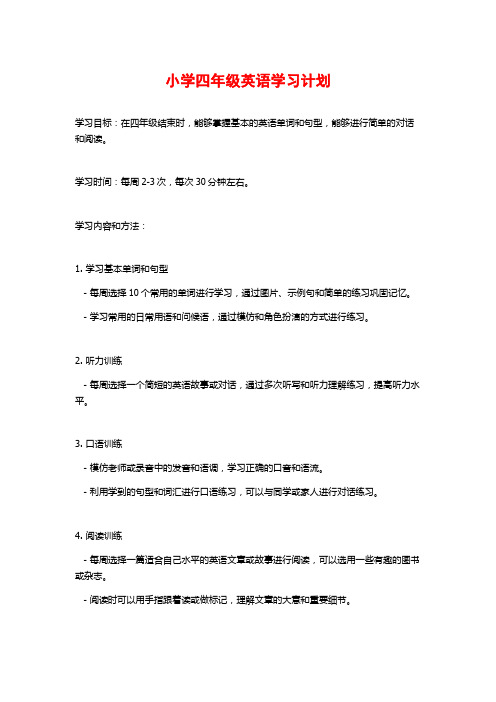
小学四年级英语学习计划
学习目标:在四年级结束时,能够掌握基本的英语单词和句型,能够进行简单的对话和阅读。
学习时间:每周2-3次,每次30分钟左右。
学习内容和方法:
1. 学习基本单词和句型
- 每周选择10个常用的单词进行学习,通过图片、示例句和简单的练习巩固记忆。
- 学习常用的日常用语和问候语,通过模仿和角色扮演的方式进行练习。
2. 听力训练
- 每周选择一个简短的英语故事或对话,通过多次听写和听力理解练习,提高听力水平。
3. 口语训练
- 模仿老师或录音中的发音和语调,学习正确的口音和语流。
- 利用学到的句型和词汇进行口语练习,可以与同学或家人进行对话练习。
4. 阅读训练
- 每周选择一篇适合自己水平的英语文章或故事进行阅读,可以选用一些有趣的图书或杂志。
- 阅读时可以用手指跟着读或做标记,理解文章的大意和重要细节。
5. 写作训练
- 每天练习写几个简单的句子,可以是自我介绍、描述动物、日常活动等。
- 根据自己的兴趣,写一些小短文或日记,记录学习的过程和生活的点滴。
6. 辅助资源
- 利用英语学习软件或网站,如Duolingo、BBC Learning English等,进行互动学习。
- 配备一本适合自己水平的英语学习书籍,例如Oxford Bookworms系列,进行阅读练习。
以上是一个简单的学习计划,可以根据实际情况进行调整。
希望能够帮助你更系统地
学习英语,提高英语水平。
小学英语新课标培训计划
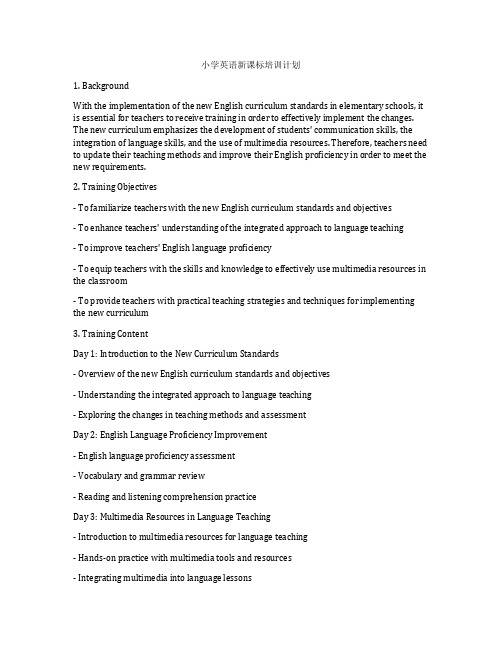
小学英语新课标培训计划1. BackgroundWith the implementation of the new English curriculum standards in elementary schools, it is essential for teachers to receive training in order to effectively implement the changes. The new curriculum emphasizes the development of students' communication skills, the integration of language skills, and the use of multimedia resources. Therefore, teachers need to update their teaching methods and improve their English proficiency in order to meet the new requirements.2. Training Objectives- To familiarize teachers with the new English curriculum standards and objectives- To enhance teachers' understanding of the integrated approach to language teaching- To improve teachers' English language proficiency- To equip teachers with the skills and knowledge to effectively use multimedia resources in the classroom- To provide teachers with practical teaching strategies and techniques for implementing the new curriculum3. Training ContentDay 1: Introduction to the New Curriculum Standards- Overview of the new English curriculum standards and objectives- Understanding the integrated approach to language teaching- Exploring the changes in teaching methods and assessmentDay 2: English Language Proficiency Improvement- English language proficiency assessment- Vocabulary and grammar review- Reading and listening comprehension practiceDay 3: Multimedia Resources in Language Teaching- Introduction to multimedia resources for language teaching- Hands-on practice with multimedia tools and resources- Integrating multimedia into language lessons- Effective lesson planning and delivery- Classroom management strategies for the new curriculum- Assessment and feedback in the integrated approach to language teaching4. Training Methods- Lectures, presentations, and discussions led by experienced English educators - Hands-on activities and group work to apply new concepts and skills- Language practice sessions to improve English proficiency- Observation and feedback on teaching demonstrations- Peer coaching and mentoring for practical teaching strategies and techniques 5. Training Materials- Curriculum standards and objectives- Multimedia resources for language teaching- English language proficiency assessment materials- Sample lesson plans and teaching materials- Teaching demonstration videos and feedback forms6. Training ScheduleDay 1: Introduction to the New Curriculum Standards- Morning session: Overview of the new curriculum standards and objectives- Afternoon session: Understanding the integrated approach to language teaching Day 2: English Language Proficiency Improvement- Morning session: English language proficiency assessment- Afternoon session: Vocabulary and grammar reviewDay 3: Multimedia Resources in Language Teaching- Morning session: Introduction to multimedia resources for language teaching - Afternoon session: Hands-on practice with multimedia tools and resources- Morning session: Effective lesson planning and delivery- Afternoon session: Classroom management strategies for the new curriculum7. Training Evaluation- Pre-training assessment of teachers' English proficiency and understanding of the new curriculum standards- Post-training assessment of teachers' English proficiency improvement and knowledge of the new curriculum- Classroom observation and feedback on teachers' implementation of the new curriculum - Follow-up support and mentoring for teachers as they integrate new techniques and strategies into their teaching8. ConclusionThis training plan aims to provide elementary English teachers with the knowledge, skills, and support needed to effectively implement the new curriculum standards. By enhancing teachers' understanding of the integrated approach to language teaching, improving their English language proficiency, and equipping them with practical teaching strategies and techniques, this training will contribute to the successful implementation of the new curriculum in elementary schools.。
2024年小学英语科目学期计划

2024年小学英语科目学期计划第一学期计划:1. 单元主题: 问候和介绍自己- 学习常用问候语和自我介绍的基本句型,如“你好,我叫…”和“我几岁了”等。
- 通过角色扮演和情景对话的方式练习问候和自我介绍。
- 学习介绍家庭成员和朋友的表达方式。
2. 单元主题: 数字和计数- 学习1-100的基本数字,并练习用英语进行计数。
- 学习基本的算术运算符号和词汇,如加、减、乘、除等。
- 通过游戏和实际应用的方式巩固数字和计数的知识。
3. 单元主题: 颜色和形状- 学习基本的颜色和形状的名称,并通过图像和实物进行识别和描述。
- 学习基本的颜色和形状的比较,如“这个比那个大”和“这个比那个小”等。
- 通过绘画和手工制作的活动加深对颜色和形状的理解。
4. 单元主题: 季节和天气- 学习四季和各种天气现象的名称,并通过图片和地图的方式了解它们在不同地区的变化。
- 学习有关天气的词汇,如晴天、阴天、下雨、下雪等。
- 通过观察和记录天气变化的方式提高学生的观察力和表达能力。
5. 单元主题: 动物和身体部位- 学习常见动物的名称和身体部位的名称,并通过游戏和动画片加深对它们的了解。
- 学习如何用简单的句子描述动物和身体部位,如“这是一条长长的蛇,它有一个大的嘴巴”等。
- 通过观察和模仿动物的动作和声音提高学生的感知和表达能力。
第二学期计划:1. 单元主题: 家庭和日常生活- 学习家庭成员的称谓和描述,如爸爸、妈妈、弟弟、姐姐等。
- 学习家庭成员的职业和日常生活的活动,如爸爸是医生,妈妈是老师,我每天早上起床等。
- 通过角色扮演和情景对话的方式练习家庭和日常生活的表达。
2. 单元主题: 学校和学习- 学习学校的各种设施和教室的名称,并通过图片和实物了解它们的功能。
- 学习学习用品和学科名称的英文表达方式,如书、铅笔、数学、英语等。
- 通过模拟校园环境和学习活动提高学生的实际运用能力。
3. 单元主题: 食物和饮料- 学习常见食物和饮料的名称,并通过图片和视频了解它们的制作和消费方式。
小学英语学习目标和计划
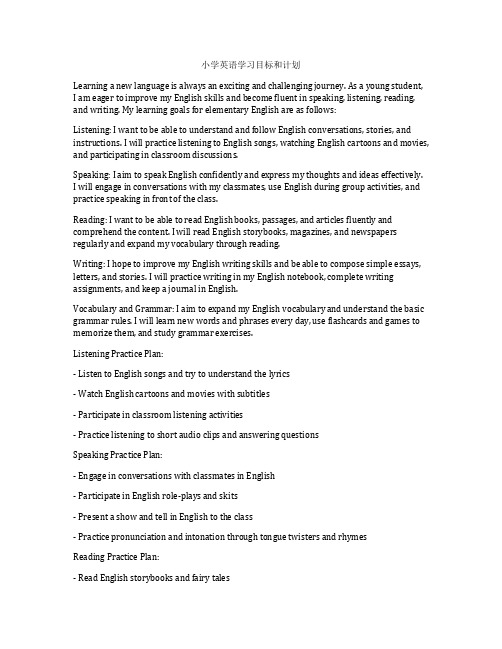
小学英语学习目标和计划Learning a new language is always an exciting and challenging journey. As a young student, I am eager to improve my English skills and become fluent in speaking, listening, reading, and writing. My learning goals for elementary English are as follows:Listening: I want to be able to understand and follow English conversations, stories, and instructions. I will practice listening to English songs, watching English cartoons and movies, and participating in classroom discussions.Speaking: I aim to speak English confidently and express my thoughts and ideas effectively.I will engage in conversations with my classmates, use English during group activities, and practice speaking in front of the class.Reading: I want to be able to read English books, passages, and articles fluently and comprehend the content. I will read English storybooks, magazines, and newspapers regularly and expand my vocabulary through reading.Writing: I hope to improve my English writing skills and be able to compose simple essays, letters, and stories. I will practice writing in my English notebook, complete writing assignments, and keep a journal in English.Vocabulary and Grammar: I aim to expand my English vocabulary and understand the basic grammar rules. I will learn new words and phrases every day, use flashcards and games to memorize them, and study grammar exercises.Listening Practice Plan:- Listen to English songs and try to understand the lyrics- Watch English cartoons and movies with subtitles- Participate in classroom listening activities- Practice listening to short audio clips and answering questionsSpeaking Practice Plan:- Engage in conversations with classmates in English- Participate in English role-plays and skits- Present a show and tell in English to the class- Practice pronunciation and intonation through tongue twisters and rhymesReading Practice Plan:- Read English storybooks and fairy tales- Use a bilingual dictionary to look up new words- Read English magazine articles and news stories- Complete reading comprehension exercises and quizzesWriting Practice Plan:- Write a diary entry in English every day- Complete English writing exercises and assignments- Write a letter to a pen pal in a different country- Create a simple English story or comic stripVocabulary and Grammar Practice Plan:- Learn 5 new English words every day and review them regularly- Use flashcards and memory games to memorize vocabulary- Practice using English grammar exercises and worksheets- Watch educational videos and tutorials on English grammar rulesIn addition to these learning goals and plans, I will seek out opportunities to use English in real-life situations. I will try to speak with English-speaking friends and family members, watch English TV shows and listen to English podcasts, and participate in English language camps or clubs.I am excited to embark on my English learning journey and look forward to achieving my goals with dedication and hard work. I believe that with consistent practice and effort, I will be able to improve my English skills and become fluent in the language.。
小学英语学习计划(15篇)
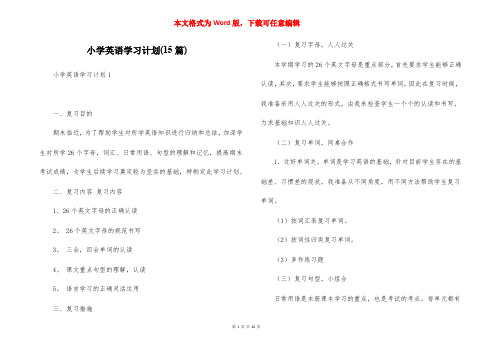
小学英语学习计划(15篇)小学英语学习计划1一、复习目的期末临近,为了帮助学生对所学英语知识进行归纳和总结,加深学生对所学26个字母,词汇、日常用语、句型的理解和记忆,提高期末考试成绩,为学生后续学习奠定较为坚实的基础,特制定此学习计划。
二、复习内容复习内容1、26个英文字母的正确认读2。
26个英文字母的规范书写3。
三会,四会单词的认读4。
课文重点句型的理解,认读5。
语言学习的正确灵活运用三、复习措施(一)复习字母,人人过关本学期学习的26个英文字母是重点部分,首先要求学生能够正确认读,其次,要求学生能够按照正确格式书写单词,因此在复习时候,我准备采用人人过关的形式,由我来检查学生一个个的认读和书写,力求基础知识人人过关。
(二)复习单词,同桌合作1.过好单词关。
单词是学习英语的基础,针对目前学生存在的基础差、习惯差的现状,我准备从不同角度,用不同方法帮助学生复习单词。
(1)按词汇表复习单词。
(2)按词性归类复习单词。
(3)多作练习题(三)复习句型,小组合日常用语是本册课本学习的重点,也是考试的考点。
每单元都有几句日常用语,从见面打招呼的不同说法到吃东西,祝愿语等,要让学生掌握不同用语的使用条件和场合,指导学生在语境中复习并熟记他们的读写。
因此,我准备采用四人小组合作的形式,1。
小组合作背诵课文2。
读单元重点句型 3。
利用黄冈小状元来复习句型四.复习时间安排1.4 ——— 1.8 复习第一~三单元,并检测1.11 ——— 1.1.15 复习第四~六单元,并检测1.18以后全面复习检测小学英语学习计划2首先,对学生的学习情况有清晰的认识。
通过对平时的单元练习测试分析进行一个汇总,从而弄清学生易错点,有针对性地进行复习,对学生掌握较好的内容可以少花点时间,而对于学生来说较难的则要想办法,通过讲解、练习、分析、总结等方法,把难点个个击破。
其次,进行有效训练,从而提高学生成绩。
所以教师必须深入题海,精选题目,提高训练实效。
小学英语学习计划表1200字

千里之行,始于足下。
小学英语学习计划表为了帮助小学生更好地学习英语,我制定了以下的学习计划表。
时间活动
每天早晨 1. 听英语歌曲
2. 朗读英语口语练习
3. 学习英语单词
每天上午 1. 观看英语卡通片
2. 跟着卡通片里的台词朗读
3. 完成一篇英语读物
每天下午 1. 参加英语角活动,与其他孩子交流
2. 进行英语拼写练习
3. 学习新的英语句型和语法知识
每天晚上 1. 回顾今天学习的单词
2. 听英语故事并复述
3. 写一篇英语作文
每周六上午:参加英语角活动,与英语外教交流
下午:进行英语口语比赛
每周日上午:观看英语电影并跟读台词
下午:完成一篇英语写作作业
第1页/共2页
锲而不舍,金石可镂。
每月去英语培训班参加模拟考试,并总结错题
此外,每两个月,小学生需要进行一次英语口语考试,以检验口语表达能力的提高情况。
在学习英语的过程中,小学生应该充分利用各种英语学习资源,如英语手机APP、英语学习网站等。
同时,还应该结合英语学习材料做好学习笔记,方便复习和总结。
此学习计划表仅供参考,具体执行情况还需要根据小学生个体情况进行调整。
希望小学生们能够爱上英语,享受学习的过程。
小学英语学习计划

小学英语学习计划小学英语学习计划(精选3篇)小学英语学习计划篇1时间过得真快,新学期又开始了。
本学期我继续担任一、二、四、五年级英语教学工作。
虽然教学质量有所提高,但是本学期小学英语教学工作依然形势严峻,任务艰巨,所以新学期一个非常必要的问题就是要指定一个切实可行的教学计划。
因为我主要是从事英语教学的,所以新学期的教学工作我主要制定以下几个计划:一、指导思想以《英语新课程标准》为指导,认真学习新课标各理念及精神。
按照新课标和新教材的理念,积极进行课堂教学模式的改革、探索,优化课堂教学过程,重视对学生能力的培养,不断提高学生的综合素质,使每位学生自信且成功地成长。
二、重点工作1、教学理论计划以《英语课程标准》为指导,以课堂教学为阵地,切实转变教学观念,坚持面向全体学生,努力创设良好的英语教学环境,进一步提高英语教学质量,同时,要有时刻学习的意识,不断更新自己的知识结构,为学生的终生发展打下良好的基础。
2、教学实践计划(1)我们斌心学校的学生英语成绩两极分化特别严重,这种状况是恶性循环,有一部分同学已经厌恶英语学习,教学有时无法进行。
所以在这学期,我计划采取多种教学方法诸如:利用直观教具、动作、表情和玩游戏等方法吸引学生,进行生动活泼的开放式的课堂教学,使学生从愉快的情景中学到知识,让学生乐于学习。
从而提高学生对英语学科的学习兴趣,提高了教学效果。
坚持向课堂40分钟要高效。
(2)努力创设良好的英语教学环境,进一步提高质量意识,为学生的终生发展打下良好的基础。
因为小学英语教材容量在不断加大,难度在加深,每周三课时已不利于学生知识的巩固和运用。
学校层面尤其要保证完成各年级的英语课时数,确保学生每周有足够的时间接触外语。
深入了解小学英语教学实际,确保学生有足够的早自习和课外辅导时间。
(3)加强中小学英语教学的衔接。
如果中、小学对英语教学互不了解,容易造成学生学习脱节或重复,使学生造成畏惧或厌倦的心理,以致影响学生的英语学习。
小学生英语学习计划

小学生英语学习计划目标:通过学习英语,我希望能够流利地读、写和说英语,掌握基本的语法和词汇知识,能够和外国朋友交流,了解世界各地的文化。
学习时间:每天晚上用于英语学习的时间为1-2小时,周末也会增加一些时间来复习和总结。
学习内容:1. 词汇学习计划:- 每天背诵5-10个新单词- 每周复习已学过的单词2. 语法学习计划:- 每周学习一个语法知识点,例如动词时态、名词复数等- 每天做一些相关的练习题3. 口语学习计划:- 每天练习朗读一篇短文- 和家人、朋友练习英语对话4. 听力学习计划:- 每周听一次英语广播或者英语歌曲,尝试理解其中的内容- 每天听英语短篇故事或者视频5. 写作学习计划:- 每周写一篇短文,描述自己的一天生活或者家乡的风景- 每天写一两个句子,练习表达自己的想法6. 阅读学习计划:- 每周阅读一本适合自己水平的英语小故事书- 每天阅读一些简单的英语文章或故事学习方法:1. 多听多说英语是一门语言,要想流利地掌握它,就必须多听多说。
可以通过和家人、朋友练习英语对话,朗读英语文章或者听英语广播来提高口语能力和听力水平。
2. 多读多写阅读能够帮助我们扩大词汇量和语感,写作可以锻炼我们的表达能力和语法水平。
因此,要多读多写,积累语言知识,提高我们的英语水平。
3. 坚持不懈学习语言是一个长期的过程,很多时候会遇到困难和挫折。
但是只要我们坚持不懈,定期复习和总结,一定会有所收获的。
每学期末我们会制定一个学习计划评估,看看自己在这段时间内取得了什么成绩,有哪些地方可以进一步加强。
希望通过这个学习计划,我能够在英语学习上取得明显地进步,达到我制定的学习目标。
小学英语目标和学习计划

小学英语目标和学习计划As a primary school student, I have set some clear goals for learning English. I understand that learning a new language can be a challenging but rewarding experience. By setting specific goals and creating a study plan, I can stay focused and make consistent progress in my English learning journey. Here are my English learning goals and study plan:Learning Goals:1. Develop basic English communication skills: I want to be able to have simple conversations in English, introduce myself, and talk about my daily activities.2. Build a strong vocabulary: I aim to learn and remember a wide range of English words and phrases so that I can express myself better in English.3. Improve listening and speaking skills: I want to become better at understanding spoken English and speaking clearly and fluently.4. Enhance reading and writing abilities: I want to be able to read simple English texts with comprehension and write short paragraphs or essays in English.5. Prepare for English exams: I want to score well in English exams and assessments at school.Study Plan:1. Regular Practice: I will practice English every day for at least 30 minutes. This includes speaking, listening, reading, and writing exercises.2. Vocabulary Building: I will learn new words every day and use them in sentences to understand their meanings and usage.3. Listening Activities: I will listen to English songs, watch English cartoons or videos, and listen to simple English conversations to improve my listening skills.4. Speaking Practice: I will try to speak in English with my family members, classmates, or friends to improve my speaking fluency and confidence.5. Reading Comprehension: I will read English storybooks, children’s magazines, and simple news articles to improve my reading comprehension.6. Writing Practice: I will write short paragraphs or diary entries in English regularly to practice my writing skills.7. Grammar and Language Rules: I will learn and understand basic grammar rules and language structures to improve my English language accuracy.8. Exam Preparation: I will review the topics and practice past exam papers to prepare for English exams and assessments at school.9. Seek Help: Whenever I face difficulties or have questions about English, I will seek help from my English teacher or use online resources for extra practice and learning.10. Stay Motivated: I will set small achievable goals and reward myself when I achieve them.I will also keep a positive attitude and stay motivated to learn English.By following this study plan and staying committed to my goals, I believe I can make significant progress in my English learning. I am excited to continue my journey of learning English and improve my language skills.。
小学制定英语的学习计划和目标

小学制定英语的学习计划和目标IntroductionLearning English is important for elementary students as it is a widely spoken language that can open many doors for them in the future. By learning English, students can communicate with people from around the world, access a wide range of information, and have more opportunities for their future careers. Therefore, it is essential to establish a clear learning plan and set specific goals to help elementary students achieve proficiency in English.Learning Plan1. Setting a Clear GoalThe first step in the learning plan is to set a clear goal for the students. The goal should be achievable and measurable to help students stay motivated and focused. For example, the goal could be to be able to hold a simple conversation in English, to understand basic English texts, and to write short essays in English.2. Creating a Structured CurriculumOnce the goal is set, a structured curriculum should be created to guide students through the learning process. The curriculum should include a variety of activities and materials to cater to different learning styles and interests. It should cover all language skills, including listening, speaking, reading, and writing. The curriculum should also incorporate fun and interactive activities to keep the students engaged.3. Providing Language Input and Output OpportunitiesTo help students improve their language skills, it is important to provide them with ample language input and output opportunities. This can be done through activities such as listening to English songs, watching English cartoons, reading English children's books, and engaging in conversations with their peers in English. Additionally, students should be given opportunities to produce language output through activities such as role-plays, presentations, and writing exercises.4. Introducing Vocabulary and GrammarAs students progress in their English learning, they should be introduced to a wide range of vocabulary and grammar concepts. This can be done through engaging activities such as flashcards games, word puzzles, and storytelling. Emphasis should be placed on using the language in context to help students understand how to apply the language rules in real-life situations.5. Regular Assessment and FeedbackIt is important to regularly assess students' progress and provide them with constructive feedback. This can be done through quizzes, tests, and speaking assessments. Additionally, students should be encouraged to reflect on their learning and set personal learning goals to help them stay on track.Goals1. Basic Communication SkillsOne of the main goals for elementary students learning English is to develop basic communication skills. This includes the ability to introduce themselves, ask and answer questions, and participate in simple conversations in English. Students should be able to communicate their basic needs and express their thoughts and feelings in English.2. Reading ComprehensionAnother important goal is for students to develop reading comprehension skills. Students should be able to understand and interpret simple English texts, such as short stories, poems, and informational texts. They should be able to identify key information, make inferences, and draw conclusions from the texts they read.3. Writing SkillsStudents should also be able to write short essays, letters, and simple stories in English. They should be able to organize their ideas coherently, use basic punctuation and grammar, and express themselves effectively in writing.4. Listening SkillsStudents should be able to understand basic spoken English, such as conversations, instructions, and simple stories. They should be able to follow along with spoken texts, answer questions based on what they hear, and engage in simple dialogue.5. Cultural AwarenessIn addition to language skills, students should also develop an awareness and appreciation of the culture associated with the English language. They should be exposed to English-speaking countries' traditions, customs, and celebrations through various activities and materials, such as videos, books, and games.ConclusionBy establishing a clear learning plan and setting specific goals, elementary students can make significant progress in learning English. With the right guidance, resources, and opportunities, students can develop their language skills and become proficient in English, enabling them to communicate effectively and access a wider range of opportunities in the future.。
小学英语课后深度学习计划
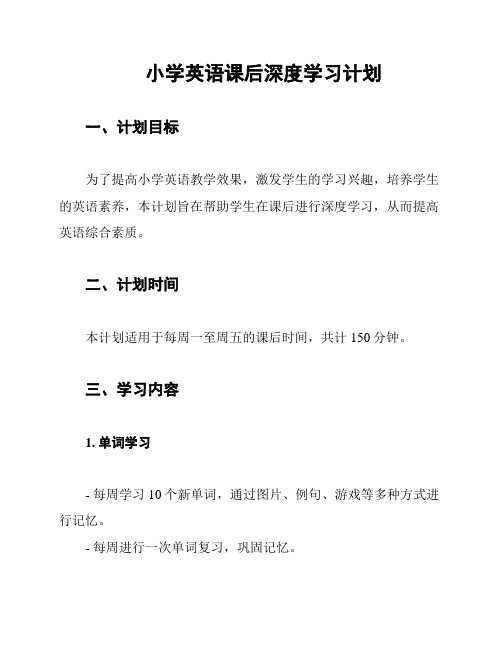
小学英语课后深度学习计划一、计划目标为了提高小学英语教学效果,激发学生的学习兴趣,培养学生的英语素养,本计划旨在帮助学生在课后进行深度学习,从而提高英语综合素质。
二、计划时间本计划适用于每周一至周五的课后时间,共计150分钟。
三、学习内容1. 单词学习- 每周学习10个新单词,通过图片、例句、游戏等多种方式进行记忆。
- 每周进行一次单词复习,巩固记忆。
2. 语法学习- 每周学习一个语法点,通过例句、练习等方式进行掌握。
- 每周进行一次语法复习,巩固记忆。
3. 阅读理解- 每周阅读一篇英语文章,提高阅读能力。
- 完成阅读后,进行答题练习,检验理解程度。
4. 口语表达- 每周进行一次英语口语练习,提高口语表达能力。
- 练习内容可以是情景对话、故事讲述等。
5. 听力训练- 每周进行一次英语听力训练,提高听力水平。
- 训练内容可以是英语歌曲、故事、新闻等。
四、学习方法1. 自主学习学生根据教材和教师提供的资源进行自主学习,完成相关任务。
2. 合作学习学生分组进行讨论、练习,共同完成学习任务。
3. 亲子互动家长参与孩子的学习过程,协助孩子完成学习任务,提高家庭英语氛围。
五、学习评价1. 定期检查教师定期检查学生的学习进度,及时了解学生在各个方面的掌握情况。
2. 单词、语法测试每周进行一次单词、语法测试,检验学生的学习效果。
3. 口语、听力评价教师对学生的口语、听力进行评价,鼓励学生提高英语实际应用能力。
六、激励机制1. 积分奖励学生完成学习任务后,获得相应积分,积分可兑换小礼品。
2. 优秀学生表彰每月评选一次优秀学生,给予表扬和奖励。
3. 进步奖对于学习进步明显的同学,给予表扬和奖励。
通过以上深度学习计划,相信学生的英语能力将得到全面提升,为今后的学习打下坚实基础。
第三英语学习计划小学

第三英语学习计划小学
第一学期
目标:掌握基本的英语句型和词汇,能够进行简单的交流
1. 每天背诵十个常用英语单词,并用它们造句。
2. 每周朗读一篇短文,理解其中的内容并背诵其中的句子。
3. 每天练习听力,听英语歌曲和简单的对话。
4. 每周进行一次口语练习,可以找同学进行对话练习,或者通过视频课程进行口语训练。
第二学期
目标:能够进行简单的日常对话和阅读简单的英语短文
1. 扩大词汇量,每天背诵二十个新词,并做相关的练习题。
2. 每周朗读一篇英语故事,并进行相关的理解和讨论。
3. 每天练习听力,听英语新闻和广播,提高听力能力。
4. 多参加英语角活动,和同学们进行英语对话练习,提高口语表达能力。
第三学期
目标:能够进行日常生活中的简单应用,包括购物、问路、介绍自己等
1. 继续扩大词汇量,每天背诵三十个新词,并进行相关的语法练习。
2. 每周朗读一篇英语小说或者科普读物,提高阅读能力和文学素养。
3. 每天练习听力,听英语广播和相关的英语节目,提高听力能力和语感。
4. 多进行口语练习,包括和老师进行英语对话练习,和同学们进行小组讨论。
通过以上的学习计划,小学生可以在三年的时间内,让学生在英语听、说、读、写方面,有一个全面的提高。
同时,老师和家长在学习过程中也应该多多鼓励和引导,让学生对学习英语产生浓厚的兴趣和热情。
同时还要注意给学生提供一些英语学习的游戏和故事等,让学生在愉快的气氛中,无形中提高他们的英语能力。
2024年小学英语工作计划模版(4篇)
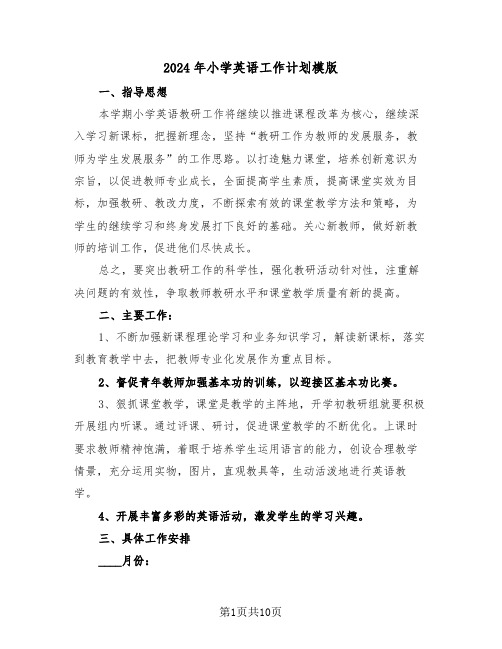
2024年小学英语工作计划模版一、指导思想本学期小学英语教研工作将继续以推进课程改革为核心,继续深入学习新课标,把握新理念,坚持“教研工作为教师的发展服务,教师为学生发展服务”的工作思路。
以打造魅力课堂,培养创新意识为宗旨,以促进教师专业成长,全面提高学生素质,提高课堂实效为目标,加强教研、教改力度,不断探索有效的课堂教学方法和策略,为学生的继续学习和终身发展打下良好的基础。
关心新教师,做好新教师的培训工作,促进他们尽快成长。
总之,要突出教研工作的科学性,强化教研活动针对性,注重解决问题的有效性,争取教师教研水平和课堂教学质量有新的提高。
二、主要工作:1、不断加强新课程理论学习和业务知识学习,解读新课标,落实到教育教学中去,把教师专业化发展作为重点目标。
2、督促青年教师加强基本功的训练,以迎接区基本功比赛。
3、狠抓课堂教学,课堂是教学的主阵地,开学初教研组就要积极开展组内听课。
通过评课、研讨,促进课堂教学的不断优化。
上课时要求教师精神饱满,着眼于培养学生运用语言的能力,创设合理教学情景,充分运用实物,图片,直观教具等,生动活泼地进行英语教学。
4、开展丰富多彩的英语活动,激发学生的学习兴趣。
三、具体工作安排____月份:1、调整教研组内成员,传达本学期的工作计划2、参加区新课程备课研讨会3、青年教师说课基本功指导4、积极参加区英语基本功比赛____月份:1、观看课堂教学录像课2、对教研组内调整的英语教师听评课____月份:1、积极参加区课堂教学艺术专题研讨会3、上课评课(三年级英语第四单元A部分)____月份1、五年级学生书法比赛2、参加区名师送课活动3、安排好学生的口语抽测并做好统计2024年小学英语工作计划模版(2)一、学情分析经过一学期的学习,三年级学生还处在初级阶段,没有较好的基础,但他们思维活跃,模仿能力和记忆力较强,所以应针对不同的学生进行分层次教学,会达到预期的效果;四年级学生基本掌握一定的英语日常用语,具备一定的英语基础,学习兴趣浓厚。
小学生英语学习计划_小学生英语学习计划范文

小学生英语学习计划_小学生英语学习计划范文
在现如今全球化的社会中,掌握英语不仅是一项重要的技能,也是未来成功的关键之一。
因此,为了让孩子更好地掌握英语,我们需要制定一套科学、全面的小学生英语学习
计划。
1. 制定学习目标
首先,制定学习目标是非常重要的一步,这样可以让孩子明确自己的学习方向,知道
自己每天需要学习的英语内容。
学习目标应当具有可实现性、明确性和具体性。
例如,孩
子可以设定每周背诵50个单词的目标或每天用英语和父母进行一次2分钟的对话。
以日为单位制定学习计划。
每天的计划应当充分利用孩子的学习时间,包括听、说、读、写四个方面。
家长可以安排电视节目、英语歌曲、口语练习等活动,帮助孩子在愉快
中学习。
3. 积极参与课堂
老师提供的资源和指导对于孩子的学习至关重要,因此鼓励孩子积极参与课堂活动,
回答老师的问题、与同学互动合作,都能够加强孩子的英语学习。
4. 多媒体学习
孩子们可以通过多媒体学习,如:听英语歌曲、看英语卡通片以及玩英语单词游戏等,更加轻松愉快地掌握英语知识。
有些英语学习软件,大多数小学生都能通过它们演练口语、阅读和写作,从而提高英语水平。
5. 培养阅读习惯
阅读是提高英语水平的重要途径之一。
放下手机,好好读书。
家长可以提供一些合适
的英语读物供孩子阅读,帮助孩子扩大词汇量,提高阅读理解能力,从而提高写作水平。
以上就是小学生英语学习计划的一些建议,如果家长能够配合老师,帮助孩子建立起
科学的英语学习习惯,孩子们必然会获得更好的英语学习成效。
2024学年度第一学期英语教学工作计划标准范文(4篇)
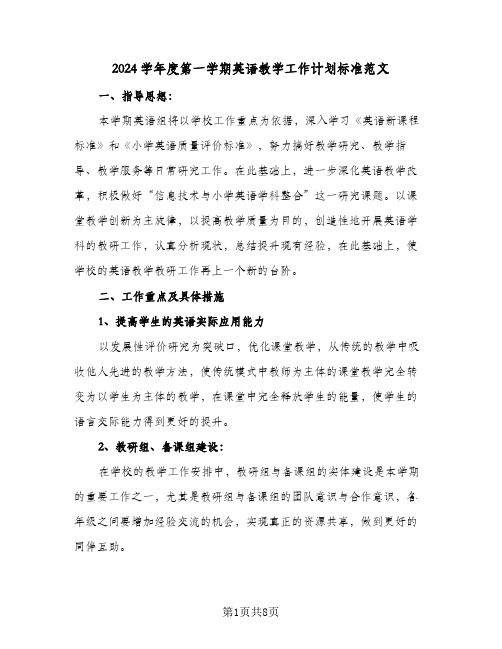
2024学年度第一学期英语教学工作计划标准范文一、指导思想:本学期英语组将以学校工作重点为依据,深入学习《英语新课程标准》和《小学英语质量评价标准》,努力搞好教学研究、教学指导、教学服务等日常研究工作。
在此基础上,进一步深化英语教学改革,积极做好“信息技术与小学英语学科整合”这一研究课题。
以课堂教学创新为主旋律,以提高教学质量为目的,创造性地开展英语学科的教研工作,认真分析现状,总结提升现有经验,在此基础上,使学校的英语教学教研工作再上一个新的台阶。
二、工作重点及具体措施1、提高学生的英语实际应用能力以发展性评价研究为突破口,优化课堂教学,从传统的教学中吸收他人先进的教学方法,使传统模式中教师为主体的课堂教学完全转变为以学生为主体的教学,在课堂中完全释放学生的能量,使学生的语言交际能力得到更好的提升。
2、教研组、备课组建设:在学校的教学工作安排中,教研组与备课组的实体建设是本学期的重要工作之一,尤其是教研组与备课组的团队意识与合作意识,各年级之间要增加经验交流的机会,实现真正的资源共享,做到更好的同伴互助。
3、认真学习并领会《小学英语学习质量评价标准》,并以此指导课堂教学,提高课堂教学的实效性。
三、各年级具体工作三年级重点工作:a.英语学习兴趣培养。
b.课本知识的____%掌握外,能接受一些课外知识增强学生的学习能力。
c.开展英语表演活动。
d.做好集体备课,认真处理好目前难度较大的教材。
e.通过所学的东西,进行英语表演活动和英语单词比赛。
四、五年级教研重点。
a.充分做好各年级插班生和后进生的辅导工作。
b.认真实在地对待口语操练,使口语操练能够切实有效的服务于英语教学工作。
c.认真开展好学科活动:书法比赛、单词竞赛。
六年级毕业班工作重点:a.认真做好毕业班工作,监控好六年级的教学质量,按照学校的要求落实好学科计划。
b.与其他年级老师们做好资源共享工作,为六年级毕业复习做好充分的准备。
c.继续训练学生各方面的能力,大胆改变六年级学生害怕开口说英语的习惯,思考出好的办法改变目前口语操练的质量。
六年级小学生英语学习计划范本(5篇)

六年级小学生英语学习计划范本单词卡记忆法:1、制作单词卡;2、每天早餐前、午餐前、晚餐前各背____个单词,不允许积累,不背不允许吃饭;3、当天晚上复习一次;4、周三和周六在作业吧找老师考核单词卡;5、准备“易错单词本”,考核时单词出错直接抄写上去,然后强化记忆三遍,回去再复习;6、半个月在作业吧考试一次单词;7、一个月考试一次单词;8、月考后如果还有单词没掌握好,写到纸条上,贴在课桌和床头等明显的地方,通过经常观察达到掌握的目的。
朗读计划:2、一天只允许朗读一篇;3、有感情的朗读,声情并茂,加入面部表情和肢体语言;4、一篇作文通过三遍朗读达到最好的效果,朗读文章是为了减轻压力、陶冶情操、欣赏美文、锻炼自己的语言表达能力,必须用心朗读;5、朗读环境可以在自己的房间内进行,最好是当着父母的面朗读,父母是评委,可以为学生的朗读进行评价,有利于亲子关系的培养;6、用心体会文章的意思,达到课外阅读理解专项训练的效果。
六年级小学生英语学习计划范本(二)为了更好地适应新课程教学的需要,努力提高自身的教育教学水平,并在科研、课题上有所发展,在本学期的工作中,我将从以下几方面进行学习:一、勤于学习,丰富自己的理论知识1、坚持阅读专业相关知识的书籍,及教育教学理论书籍,并且广泛了解其他专业的知识扩大自己的知识面。
努力从各方面充实自己,以不断给学生新信息、新知识,使课堂教学常教常新。
3、积极参加校内外的听课活动,多向经验丰富的教师请教。
二、善于反思,深刻省察自己的教育教学策略1、做一名善于反思,勤于积累的教师。
3、探索教学规律,努力形成自己的教学风格和特色,成为一名优秀教师。
三、打造精彩课堂,提升课堂教学能力1、在总结自身的教学特点基础上,大胆创新提高课堂教学效率,使自己的教学有一定的特色。
2、积极参与各类公开课、观摩课、优质课活动,每学期坚持多参加教育教学方面的研讨活动。
四、乐于研究,增强教育科研能力1、在平时的教学中,把自己的行动和教学研究结合起来,不断地总结,发现问题就研究问题,最终解决问题,改进教育教学。
- 1、下载文档前请自行甄别文档内容的完整性,平台不提供额外的编辑、内容补充、找答案等附加服务。
- 2、"仅部分预览"的文档,不可在线预览部分如存在完整性等问题,可反馈申请退款(可完整预览的文档不适用该条件!)。
- 3、如文档侵犯您的权益,请联系客服反馈,我们会尽快为您处理(人工客服工作时间:9:00-18:30)。
小学英语新课标学习计划篇一:小学英语学习习惯培养计划小学英语学习习惯培养计划王茜一、指导思想《新课标》明确指出:“在小学,使学生学好英语,养成良好的学习习惯,对于提高全民族的素质,培养有理想,有道德,有文化,有纪律的社会主义公民,具有十分重要的意义。
”良好的学习习惯,是学习知识,培养能力,发展智力的重要条件。
因此,培养学生的良好的学习习惯,是教师长期而又艰巨的任务。
二、培养目标(一)首先培养小学生良好的听的习惯。
我要求三四年级初学英语的小学生经常看英语类的动画片。
众所周知,语言的习得重要的是语言环境,我们国家的母语是汉语,不可能接受自然的英语熏陶,因此,只有人为的创造语言环境、强化训练、增加接触英语的时间,借以扩大语言的输入量。
英语类的动画片既硬气了学生学习英语的兴趣,又给他们营造了良好的语言环境。
学习英语是从“听”起步的。
“听”是“说”的前提,没有“听”,就无从模仿“说”。
只有听得清,听得懂,才能说得准,说得好。
用心地多听他人说英语,有助于培养对英语的敏捷反应。
因此,培养学生认真听教师或者录音的示范发音,用心听他人说英语是至关重要的。
小学阶段,我们要求学生认真听示范发音,听清后再模仿,用心听他人说英语。
在英语课堂教学中,我们认为应该着重培养小学生三种听的习惯。
1.仔细听的习惯。
听的练习要做到有目的、有计划、有要求。
在训练过程中要培养学生仔细听的好习惯。
做到开口前要先听;学习新课的过程不忘听;在巩固环节中适当听;课余时间经常听。
2.善于倾听的习惯。
儿童心理学告诉我们,小学生爱模仿,模仿性强,但缺乏自控能力。
课堂上,常有学生一听教师示范发音,就急于开口模仿,轻声跟读,结果导致自身发音欠准,而且还影响了他人听音。
因此,在英语起始教学阶段,教师就要训练学生静心听。
教师要引导学生“听清”,在播放录音前,可分步提出听的具体要求,使听一遍录音,便有一次收获。
英语课堂教学是小学生用英语交际的主要场合。
其间,他们有很多听英语的机会。
但小学生有意注意较弱,维持时间较短,特别是在听同学发言时易走神。
教师除了向学生讲明专心听同学发言的好处外,在教学上要采用生动、形象、活泼、多样的教学方法(本文来自: 小草范文网:小学英语新课标学习计划)与手段,如有意点叫、个别提问,对活动与集体操练应频繁交替使用。
3.用英语思维的习惯。
由于受到母语的影响,很多学生在听的过程中往往将听到的内容译成汉语,用汉语进行思维理解,而缺乏直接用英语思维的习惯。
不能做到边听、边理解、边记忆。
对此,我们要通过循序渐进的训练,让他们将听懂了、并理解了的信息联系起来形成连贯的记忆,并且将全文的要点通过这些联系有机地统一起来。
(二)其次培养小学生良好的说的习惯积极参加语言实践活动,大胆开口说英语,是英语学习所必需的。
小学生是学习第二语言的最佳时期,这一年龄段的学生,学习语言所具有的天赋是成年人所不可比拟的。
从心理学、生理学角度来看,三年级学生人小,较之高年级学生心理障碍和怕羞感少。
这正是培养大胆开口讲英语的有利条件之一。
因此,教师得抓住时机,充分运用教材,从起始年级,让学生大胆开口说英语、并且做到音量适度、仪表大方。
1.教师应十分发挥“情感教育”在英语教学中的作用。
古人曰:“亲其师,才能信其道。
”教师要用“师爱”去赢得学生的亲近和信任,使师生感情双向交流,密切师生关系,形成轻松、愉悦的课堂气氛,从而有效地帮助学生消除心理障碍,克服怕开口说英语的紧张心理,开创敢讲英语、争讲英语、爱讲英语的局面。
2.教师要精心组织教学,优化教学方法。
利用一切教学媒体(图片、实物、玩具、幻灯、投影、录像、录音、指套、木偶等等)创设情景,寓教于乐,让学生身臵语境,有意识或无意识地开口练说,最大限度地发挥学生说英语的主动性和积极性。
3.教师要从课内到课外尽可能地为学生创造语言实践机会。
如:强调师生间同学间用英语问候,要求学生把所学英语用到日常生活中去,对做得好的学生给予赞赏。
以此造成说英语的氛围,激励学生多开口说英语。
(三)再次培养小学生良好的读的习惯根据《小学英语新课程标准》的要求,教师在训练中,必须要把好语音关,严格要求,适度纠音,持之以恒,切实打好语音、语调基础。
英语朗读要有正确的读音跟语调,必须靠多读多练。
即要求同学们在朗读过程中养成正确理解、准确模仿、深刻体会、主动表达的学习习惯。
1.培养学生听录音跟读的良好习惯。
与教材配套的录音带中有男、女、大人、小孩的不同音色,其音自然、地道。
小学生模仿力强,如果他们能坚持跟录音朗读,并自觉地将自己的读音与标准规范的音调进行对比,纠正自己音调上的错误,那么这将为他们打好语音、语调的良好基础。
2.培养学生大声朗读的良好习惯。
为了不致于学成“哑巴外语”和“聋子外语”,需要读出声来。
其实,朗读的作用还不止于此,最重要的是朗读能够加强记忆。
先可以大声朗读单词、短语、句子和课文,水平稍有提高后可以朗读报并巩固。
3.培养学生眼到、口到、心到的良好朗读习惯。
受儿童年龄特征的限制,小学生的朗读往往随心所欲,不注重意群,甚至读破句。
针对这种情况,在教学过程中,尤其是新授朗读句子时,要重视对学生朗读技法的指导,使小学生形成良好的英语朗读习惯。
4.培养学生用英语进行对话的良好习惯。
语言是用来交际的,如果学生仅仅会说书本上的几个句子,一旦情境发生改变,学生就会变得无所适从。
因此我们平时应加强培养小学生用英语进行对话的习惯。
从最简单的日常交际用语开始,逐渐过渡到自己创造性的发挥。
(四)最后培养小学生良好的写的习惯。
养成书写规范的习惯。
每一种文字都有统一的形体标准(即“正字法”),英语也是如此。
在入门阶段,书写教学要严格要求,培养学生正确、端正、熟练地书写字母、单词和句子的能力,能用书写体在三格本上熟练、清楚地书写,格式、大小写、连笔、标点正确。
为了使小学生养成良好的英语书写习惯,教师必须注重规范书写,提高小学生英语书写素质。
小学生书写英文,从字母到单词,最后到句子,教师不能掉以轻心,马虎对待。
在教学中,教师要注重以下三个个方面:首先,教师自己的板书应该规范、标准。
其次,教师要保证学生有充分的书写时间。
最后,教师要注意及时纠错。
总之,良好学习习惯的培养与训练,本身就是教学工作的一项任务,我们应该有步骤、有计划的在教学过程中逐一落实。
提早开始,严格要求,持之以恒。
好的学习习惯会成为学生英语学习的催化剂,使他们的英语成绩迅速提高。
篇二:小学英语教学计划XX-XX学年小学英语教学计划李艳现目前英语教学成为国家教育改革很重大的变革科目之一。
以前都是城镇学生小学就学习英语,而农村学生只有在升入初中之后才接触英语学习。
现在的英语教学已经到了农村小学,在学生上小学的时候就要开始新的英语教学了。
针对学生的学习情况,本学期我将重点投入到以素质教育为指挥棒的教学宗旨,激发学生学习英语的兴趣,培养他们学习英语的积极态度,使他们建立初步的学习英语的自信心;培养学生一定的语感和良好的语音、语调基础,使他们形成初步运用英语进行简单日常交流和书写,为进一步学习打下基础。
我根据自己和学生的实际情况制定了以下教学工作计划:一、学生情况我校学生是从三年级开始学习英语,而我所任教的是四、五年级,这个阶段的学生思维活跃,模仿能力和记忆力较强,所以应针对不同的学生进行分层次教学,可能才会达到预期的效果;其次,四、五年级学生基本掌握一定的英语日常用语,具备一定的英语基础,因此对他们而言,英语基础知识需要继续深入的渗透,把重点放到听、说、读、写的要求上。
扩大学生对西方国家了解的知识领域,充分发展学生在生活中使用英语的能力和习惯。
二、指导思想认真学习《纲要》内容,以《英语课程标准》为指导,以课堂教学为阵地,切实转变教学观念,坚持面向全体学生,努力创设良好的英语教学环境,- 1 -进一步提高质量意识,为学生的终生发展打下良好的基础。
三、教学目的、任务小学英语教学在过去几年的发展中,在领导、学校的关心和重视下,取得了一定的成绩,教学、教研活动蓬勃展开,教学质量逐年提高。
但是,本学期小学英语教学工作依然形势严峻,任务艰巨:首先,师资紧,课时少,教学任务重;其次,就我自身而言,刚踏入小学英语教育行列,对教材要求把握不够到位,正和学生处于一个认识、磨合和相互适应的过程。
为此关于本学期的主要目的有以下几个方面:1、提升学生学习英语的兴趣,养成良好的朗读、书写习惯;2、发音准确、朗读流利,准确掌握书中的重点内容;3、能够进行简单的日常用语的交流;4、能够用简单的句子进行写作(简单造句);5、熟练掌握所学歌曲、chant等;6、强调语言运用。
两本教材都体现交际教学思想,注重学生语言应用能力的培养。
在起始阶段采用"全身动作反应法"(老师的body language),让学生在做中学,在唱中学,在玩中学。
8、注重能力培养。
整套教材贯穿"学会学习"的主题,培养学生自主学习和独立运用所学语言去做事情的能力。
如Let's learn /Let's try /Let’s talk。
9、突出激发学习兴趣。
教学形式多样化,其中包括对话、歌谣、小诗、- 2 -歌曲、游戏、任务、绘画等。
四、教学重点难点 1.重点:(1)提高课堂效率。
(2)养成良好的听英语、说英语、读英语和简单书写句子的习惯。
(3)发音清楚,语调正确,书写工整。
2.难点:使英语基础差的学生提高听、说、读、写的能力,全面提高英语成绩。
五、方法措施1、认真备课,钻研教材,进行课堂的有效教学,提高课堂效率,做到当堂内容当堂掌握。
2、创新运用各种不同英语教学法来辅助教学,如:情景教学法、直接教学法,并开展一些有趣的活动、游戏让学生在轻松的氛围中学习英语,让学生多读多说多对话。
3、创设英语情景和环境,使学生们在一定的英语语言环境里学习“第二语言”。
做到“生活中有英语,英语中有生活”。
4、鼓励学生大胆说英语,肯定他们的进步(尤其是英语基础不好的学生),树立学生的信心,培养学生朗读和书写的习惯。
5、注重教材的灵活性和可操作性,以满足不同层次的学生的需求。
帮助- 3 -英语基础不好的学生,提升英语基础好的学生。
6、多教授chant和歌谣或小故事等促进学生多单词和句型的记忆。
充分利用教科书中的课文创设的情景对话,为学生提供使用英语进行交流的机会。
7、课堂尽量全英化,打好每名同学的英语基础,重点提高差生的英语功底,同时适当地补充些课外内容,强化口语和应试能力,对每一单元的内容力争人人过关。
8、练习形式多种多样,手、脑、眼、肢体并用,静态、动态结合,基本功操练与自由练习结合,单项和综合练习结合。
通过大量地实践,使学生具有良好地语音、语调、书写和拼读地基础,并能用英语表情达意,开展简单的交流活动。
